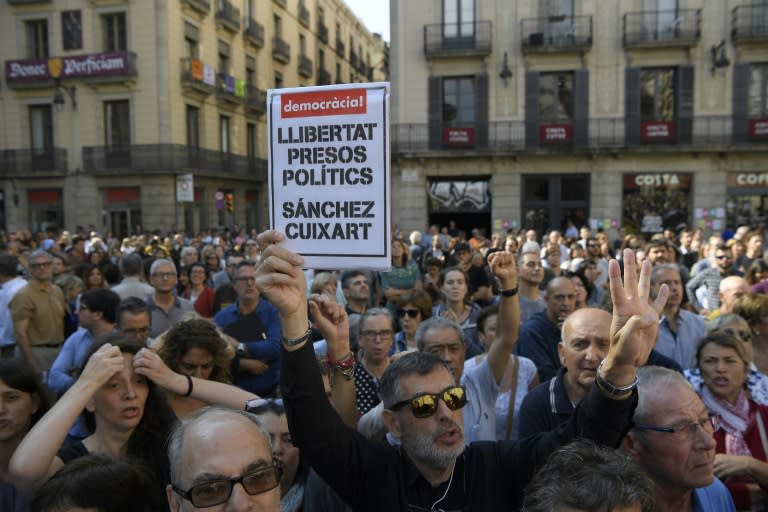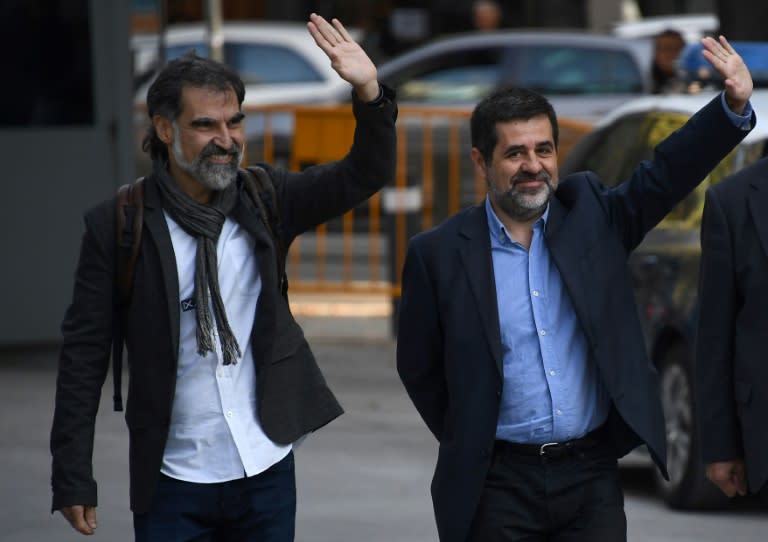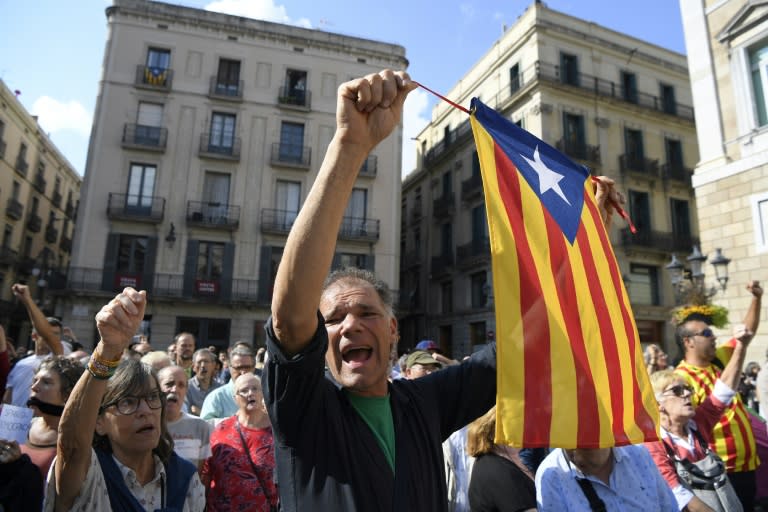Catalans rally against separatist leaders' detention
Thousands of people took to the streets of Catalonia Tuesday after a judge ordered the detention of two separatist leaders, further inflaming tensions over the region's chaotic referendum on splitting from Spain. Thousands of workers in Barcelona and other cities staged a brief walkout at noon in protest at Monday's move by the National Court in Madrid to keep Jordi Cuixart and Jordi Sanchez behind bars pending investigations into sedition charges. "Repression is not the solution," protesters shouted as hundreds gathered outside the Catalan regional government offices in central Barcelona. "Now anyone can be put in jail," said Carme Guell, a 62-year-old beautician who joined the walkout as civil servants from nearby regional ministries blocked the street. Like many who back independence for Catalonia -- which is profoundly divided on the issue -- Guell said the wealthy northeastern region was "treated like a colony. All our money is taken away, nothing is reinvested here." The demonstrations came as the clock ticks down to Thursday when Madrid has ordered Catalonia's separatist leader Carles Puigdemont to spell out whether or not he intends to declare independence outright following the referendum on October 1. Puigdemont has so far declined to give a definitive response after issuing a cryptic "suspended" declaration of independence last week, calling instead for Prime Minister Mariano Rajoy to come to the negotiating table. But Rajoy rejects mediation as a non-starter and unless Puigdemont backs down, appears likely to start imposing direct control over the semi-autonomous region. That would further escalate Spain's worst political crisis since it emerged from military dictatorship in 1977. - Economic jitters - The referendum, marred by a heavy police crackdown on voters, resulted in a 90 percent 'Yes' vote. But turnout was only 43 percent as many supporters of Spanish unity stayed away after the Constitutional Court ruled the vote illegal. The court on Tuesday struck down the Catalan law that paved the way for the referendum, ruling unanimously that the region does not have a "right to self-determination". With the two sides stuck in stalemate, Madrid announced late Monday that it was cutting its economic growth forecast for next year from 2.6 to 2.3 percent. The prolonged uncertainty has rattled stock markets, while nearly 700 companies have moved their legal headquarters out of Catalonia, according to official figures released Tuesday. - 'Political prisoners' - Silent demonstrations against the detention of Cuixart and Sanchez were planned across Catalonia on Tuesday evening, with a candle-lit demonstration in Barcelona at 8:00 pm (1800 GMT). Other protests were planned in Brussels and London. The pair nicknamed the "two Jordis" are the leaders of pro-independence citizens' groups Omnium Cultural and the Catalan National Assembly (ANC). The groups count tens of thousands of members and have emerged as influential players in the crisis. They are accused of encouraging a major protest last month as Spanish police raided the Catalan administration's offices in the run-up to the referendum. Police officers were trapped for hours and their vehicles vandalised as protesters ringed the building, with Cuixart and Sanchez standing on a police car calling for "permanent mobilisation" against the Spanish state. The crime of sedition can carry up to 15 years in prison. Though she opposes the current drive for independence, Barcelona's leftist Mayor Ada Colau blasted the move to detain Sanchez and Cuixart, who she said were being held as "political prisoners". "The existence of political prisoners has no place in the current EU," she said, announcing the city council would halt meetings for two days in protest. Catalan police chief Josep Lluis Trapero has also been charged with sedition for allegedly failing to stop the referendum. He has been allowed to walk free, but is banned from leaving Spain. - Catalans split - With its own language and culture, Catalonia is proud of its autonomy but its 7.5 million people are split over whether to break away completely from the rest of Spain. Supporters of independence say the region pays more into Spanish coffers than it gets back and could prosper by going it alone, but their opponents say secession would spell political and economic disaster. Ratings agency Standard and Poor's has warned of a recession in Catalonia -- which makes up about a fifth of Spain's economic output -- if the crisis drags on.





